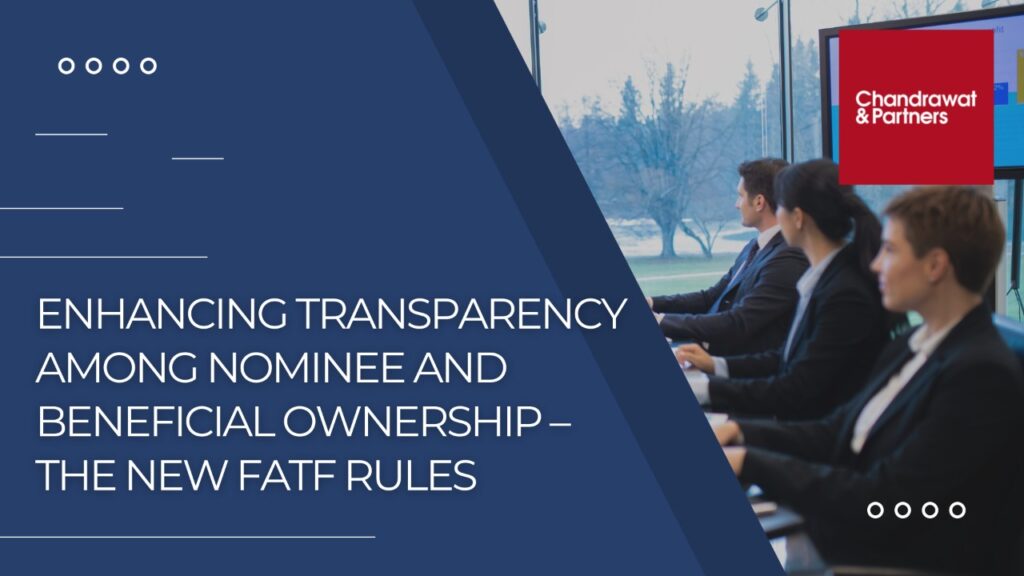A nominee, as defined in the FATF is a natural or legal person holding a role in a company as an agent acting upon instructions of a nominator who has a more substantive claim to control and/or ownership of the company. In many cases, the nominator is the beneficial owner of the company.
While many types of nominee arrangements have legitimate business purposes and pose minimal or no money laundering or terrorism financing risks at all, nominees can also be used as a deliberate device to evade beneficial ownership transparency rules by posing an obstacle to transparency, and thereby facilitating the misuse of companies and other corporate vehicles for money laundering and related crimes.
Therefore, to address these loopholes and to strengthen the nominee arrangements The Financial Action Task Force (“FATF”) FATF adopted recommendation 24 to change its rules on beneficial ownership of legal persons. Recommendation 24 deals with rules on beneficial ownership.
The FATF established the first international beneficial ownership transparency standard in 2003 and strengthened it in 2012. Recommendation 24 and its interpretive note require countries to take measures to prevent and mitigate the risk of the misuse of nominee shareholding and nominee directors.
Legal contracts in the context of the measures on nominees under Recommendation 24:
Recommendation 24 mentions about these legal contracts related to nominees:
- Professional nominee arrangements offered by corporate service providers.
- Professional nominee director and nominee shareholder services offered by corporate service providers.
- Power of attorney arrangements used in concert with nominee arrangements.
- “Signature for sale” agreements, e.g. a “nominee director declaration”, in which the nominee is simply a front with no substantive connection with the company.
Need for the changes in nominee and beneficial owner relationships
Over the years, FATF has come across a number of significant disclosures that have shown widespread, systematic abuses of legal persons for the purpose of concealing monies of dubious origin, dodging sanctions, avoiding paying taxes, and protecting assets from law enforcement under the nominee name and the prevalent rules has shown a poor level of effectiveness in preventing misuse of legal persons and nations should exert more effort to swiftly, completely, and successfully apply the current FATF requirements . The evolving dangers of money laundering, as well as publicly reported failures to stop the abuse of legal persons, demonstrate the need for updated standards. Therefore, after intense discussions among FATF member countries for the purpose of strengthening its norm on beneficial ownership, the FATF plenary enacted a number of substantial adjustments.
Changes made under the revised Rec. (Recommendation)24
The important changes include-
- Clarifications were made under the risk-based approach and it now includes a broad responsibility for nations to reduce dangers found in a risk assessment of legal persons.
- The updated rule mandates a greater focus on and knowledge of the dangers posed by foreign entities to which the nation is exposed. Countries should have a procedure in place to find out who owns foreign legal entities that are “sufficiently linked” to their nation.
- To create a collective mechanism of beneficial owner relationship and to require all registries to have a centralised registry, a registry held by a public authority, such as a corporate registry, has received a lot of attention.
- Some new definitions of adequate, accurate and up-to-date beneficial information were also provided.
Transparency Requirement:
The new rules on nominees focused on enhancing the transparency policies for shareholders and nominated directors. The former regulations gave countries a great deal of freedom in how they handled candidates because they could introduce undefined alternative methods to prohibit abuse. As a result, this issue did not receive significant attention in FATF mutual evaluation meetings and under the new rules three options were provided to enhance control those are-
- i) Nominee shareholders and directors must disclose that they are acting as a nominee (i.e. their nominee status) and the identity of the nominator upon whose instructions they are acting to the company.
- ii) The aforementioned information should be reported by the company or by the nominee to the relevant register or alternative mechanism as designated by the country (e.g. the shareholder register of the company, the company register or if a beneficial ownership register exists, to this register), regardless of whether the nominee arrangements are formal or informal.
iii) The information should be obtained, held or recorded by the beneficial ownership registry or alternative mechanism, as applicable in the country.
- iv) The country should include the nominee status of nominee directors in public information, e.g. by adding a label or an asterisk to the names of directors who are nominee directors, on the relevant registry.
- v) Nominee shareholders and directors must be licensed in order to offer nominee services, or belong to a licensed and regulated profession under AML regulations.
Impact of recommendation 24
The recent changes to the FATF rules were made to promote transparency, strengthen international standards on legal persons, and reduce the risk of misuse. The new rules gave a new definition for nominee and beneficial shareholder relationships and clarified the relationships among nominee and beneficial ownerships and also highlighted the need for further guidance to assist countries and the private sector in meeting these obligations. The Recommendation 24 adjustments that have been implemented will increase the worldwide response to the issue of legal persons concealing beneficial ownership. Additionally, the FATF will start the revision process for its methodology for evaluating these new requirements and it is expected that the FATF will take concrete steps to implement these latest changes promptly and adequately.
For more information or queries, please email us at
enquiries@chandrawatpartners.com




